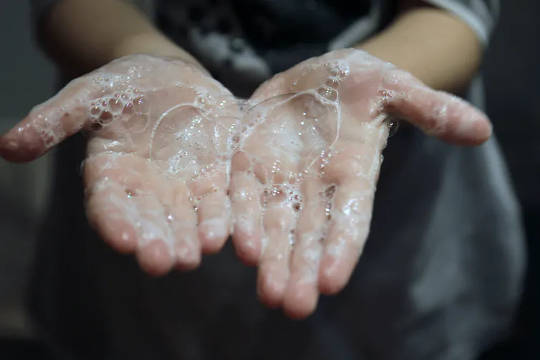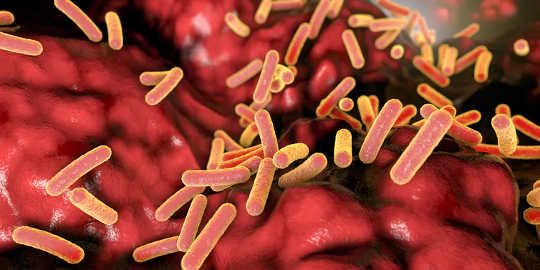
One thing everyone agrees on: Hand-washing helps prevent the spread of the coronavirus. Getty Images / Isabel Pavia
Mask-wearing has divided the country, but hand-washing – one might think – is something virtually everyone would agree on. Hand-washing, after all, is one of the most critical parts of preventing the spread of infectious disease.
But many millennials have washed their hands of bar soap, so to speak. They claim it’s contaminated with germs. Instead, they use liquid soap.
So what’s best – bar or liquid? Does it matter?
I am a doctoral student at the University of Oregon’s Institute of Molecular Biology, and here’s my take, prefaced with some background. First: Disease-causing microbes are too small for us to see. But imagine if we could. We would see the coronavirus on our hands, and immediately know when to wash and what surfaces, or people, to avoid. This would quickly eradicate the pandemic.
Get The Latest By Email
We also can’t see the trillions of microbes – the bacteria, fungi and viruses – residing in our microbiomes, something that all animals, from people to peacocks to porpoises, carry in their bodies; we are ecosystems that house all kinds of microbial life. As one of my graduate school professors would say: “We are walking clouds of microbes. All of us are just like the Peanuts character Pig-Pen.”
 An illustration of Faecalibacterium prausnitzii, an abundant bacterial species found in the human gut. It’s believed to give protection against inflammatory bowel disease, Crohn’s disease and colon cancer. Getty Images / Science Photo Library / Kateryna Kon
An illustration of Faecalibacterium prausnitzii, an abundant bacterial species found in the human gut. It’s believed to give protection against inflammatory bowel disease, Crohn’s disease and colon cancer. Getty Images / Science Photo Library / Kateryna Kon
Trillions of microbes
The human intestine harbors the bulk of the microbiome, with each discrete turn and mucus layer creating different micro-environments. Our mouths and skin also host distinct communities. And like Pig-Pen, each one of us is constantly transferring and acquiring microbes as we come in contact with surfaces or other people.
Lots of studies bear this out. Housemates have more similar microbiomes compared to people who don’t live with them; dog owners have a skin microbiome more like their dog than other dogs; and bacterial communities found living on a classroom surface have been linked to humans. For instance: The bacteria found on the seats of the chairs matched bacteria found within the human intestine and vagina. And the bacteria on the desk surfaces matched bacteria found in human mouths and skin.
Thinking of people as walking carriers of invisible microbes may sound sort of creepy. But only a small fraction of microbial species cause disease. In fact, our microbiome can protect us from the bad microbes, including viruses. Conversely, research shows a low-diversity microbiome is associated with many diseases. And one way to develop a diverse microbiome is through transmission. To cite just one example, zebrafish in group housing had significantly more microbiome diversity compared to solitary zebrafish.
That said, as the coronavirus rages, it’s critical we decrease microbial transmission to prevent the spread of a pathogen that has killed hundreds of thousands worldwide. COVID-19 is transmitted by droplets from breathing, coughing and sneezing. Inhaling those droplets, or touching our eyes, mouth or nose after touching a contaminated surface, can let the coronavirus invade our bodies. This is why we must continue to practice social distancing and wear face masks.
Proper hand-washing kills COVID-19
Washing with soap and water for at least 20 seconds decreases the number of microbes on our hands. This is the case whether you’re using bar soap or liquid soap. Both types have surfactants, or molecules that reduce surface tension, that allow the soap to spread. The surfactants of soap are compounds with a dual property: One part interacts with water, the other part interacts with the dirt, oil and microbes on our skin.
COVID-19, an “enveloped” virus surrounded by a lipid, or fatty acid, membrane, is an easy mark for these surfactants, which are effective at dissolving the membrane. This essentially kills the virus.
Bar or liquid soap?
Bar and liquid soaps are equally effective in lowering the number of microbes on our skin. Because both have surfactants, one is not better than the other. Aesthetically, they’re a bit different. Some bar soaps leave a residue on the soap dish, which some people find messy and unpleasant to look at. And both have a different carbon footprint.
The use of bar soap dates back to at least 2800 B.C. Animal or vegetable fats are converted into soap and an alcohol when it reacts with alkali (usually lye). The friction created by rubbing your hands with bar soap is a bonus in hand hygiene, as it might remove debris better. Although bacteria may grow on bar soaps – this worries some people – studies show there is little to no transmission from bar soap to hands during washing.
Liquid soap, mass-produced beginning in the 1980s, contains detergents, which are synthetically made surfactants. Liquid soaps typically cost more and require five times the energy to produce and 20 times the energy for packaging (in plastic bottles). Bar soaps, because they require production of the vegetable and animal oils, have a larger impact on land use, but their packaging is minimal.
To fight COVID-19, use either bar or liquid soap. It doesn’t matter. What does matter: Because there’s no COVID-19 vaccine yet, nor a way to quickly know who’s a carrier, we must unite as a society to practice three simple lifesavers – social distancing, wearing face masks and hand-washing. Scrub away.
About the Author
Michelle Sconce Massaquoi, Doctoral Candidate in Microbiology, University of Oregon
This article is republished from The Conversation under a Creative Commons license. Read the original article.
books_health







